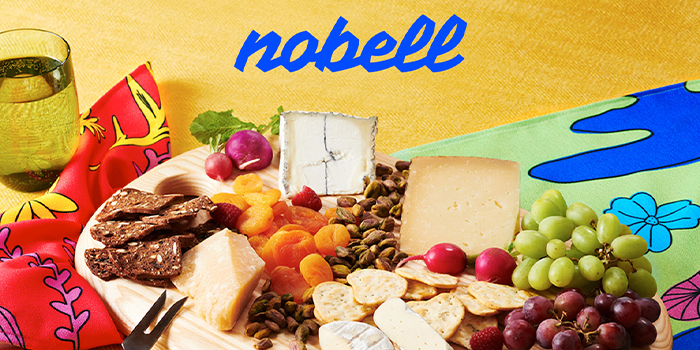Nobell Secures $75M, Will Tackle Plant-Based Dairy’s ‘Last Frontier’

Over the last several years, large numbers of consumers have made the jump from animal-based dairy products to plant-based alternatives. Yet, while interest in plant-based cheese has increased, many products’ inability to recreate the taste, texture and coveted cheese pull formation has held some shoppers back.
However, plant-based cheese maker Nobell believes it has found the solution. The company announced last week that it has secured $75 million in funding to scale the production of its plant-based cheese products made with casein — an essential protein found in milk that gives cheese its taste and texture — cultivated from genetically modified soybeans, rather than cows.
Participants in the round included Andreessen Horowitz, Bill Gates-backed Breakthrough Energy Ventures and Robert Downey Jr.’s FootPrint Coalition Ventures, along with Unovis, Germin8 Ventures, Fifty Years, AgFunder, Pear VC, Hillhouse Group’s venture capital arm GL Ventures and Mission Bay Capital. Startup accelerator Y Combinator invested $25 million into the company in 2017, bringing Nobell’s total capital raised to-date to $100 million.
San Francisco-based Nobell is led by founder and CEO Magi Richani, a former project engineer at Shell, who set out to tackle what she saw as alt-dairy’s “last frontier” — cheese — after discovering that she was lactose intolerant. After looking at what makes dairy unique and “addictive,” and thus keeps many consumers from making the jump to plant-based options, the answer came in the form of casein, a protein only produced by lactating female mammals.
Although vital to obtaining cheese’s signature stretchy texture, casein was not “born to be cheese from the start,” Richani said. The need for cows, goats and sheep means the end product has a large carbon footprint. So, she turned to plants to simplify the cheese-making process, genetically editing the soybean plant — a crop grown on nearly 90 million acres of land across the U.S. — to be a more efficient and climate-friendly form of casein production.
“Why would you feed cows plants, and then impregnate them, milk them, grow them, when you can feed people plants directly?” she said.
By garnering support from the Good Food Institute and sparking investor interest through Y Combinator, Nobell has operated in stealth mode until now in order to maintain focus, Richani said.
“It’s the easiest thing in the world for a startup to spend all their time being featured everywhere,” she said. “I think the hardest part is not doing that, and focusing on really building the core innovation, and what makes the company what it is.”
Now, with a solid plan for production, the company is turning its focus to commercialization, Richani said. Plans call for launching its first branded products in late 2022 or early 2023. Following the path set by plant-based meat success stories such as Impossible Foods, Nobell will initially target a rollout in foodservice locations before looking to brick-and-mortar retailers. For its initial products, the company is zeroing in on the most popular cheeses in foodservice — “American-type” cheddar for use on sandwiches and burgers and mozzarella for pizza.
As a genetically modified product, the casein will need to receive Generally Recognized as Safe (GRAS) approval from the FDA in order to be sold directly to consumers in retail, she said. Once the product can be sold to shoppers, Nobell will then have to explain its unique production process to consumers, which will require an investment in education and marketing, she added. Although some consumers are wary of food items containing GMOs, Richani believes an emphasis on transparency and educating shoppers about how genetic engineering can be a tool to combat climate change will be key to changing these shoppers’ minds.
“There is a stigma around the use of genetic engineering and food, and I think it’s for a good reason because it was not always used for the best interests of people that are consuming food,” she said. “I think that we have some work to do to almost reintroduce the concept and talk about the benefits [of genetic engineering] to the consumer.”
In addition to the emphasis on messaging, Nobell will use the funding to move from benchtop to pilot production, expand its team and switch from greenhouse to field cultivation. The funding will also be used for development of other applications for its protein beyond cheese, Richani said.
Plant-based cheese brought in $270 million in sales last year, up 42.5% year-over-year, and is growing twice as fast as animal-based cheese, according to a report from the Plant Based Foods Association and the Good Food Institute. It’s also garnered investment interest, with Motif Foodworks raising $226 million last month as it works to enhance the taste and texture of plant-based meat and cheese. Ingredient suppliers Perfect Day and Remilk, which both produce dairy-free animal proteins through fermentation, also closed funding rounds last year.
As more and more companies vie to create the perfect plant-based dairy products, Richani said she sees the plant-based category as a place to unite around a common goal, believing that “the real competition is the status quo.”
“Whatever your philosophy is, whatever your technology is, or your science is, I think we need to focus on the shared mission and really relentlessly work towards that,” she said. “We’re running out of time, and this is the last moment that we have to take action.”
















